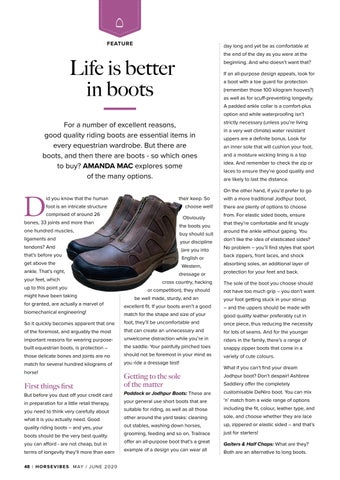FEATURE
day long and yet be as comfortable at the end of the day as you were at the
Life is better in boots
beginning. And who doesn’t want that? If an all-purpose design appeals, look for a boot with a toe guard for protection (remember those 100 kilogram hooves?) as well as for scuff-preventing longevity. A padded ankle collar is a comfort-plus option and while waterproofing isn’t
For a number of excellent reasons, good quality riding boots are essential items in every equestrian wardrobe. But there are boots, and then there are boots - so which ones to buy? AMANDA MAC explores some of the many options.
D
strictly necessary (unless you’re living in a very wet climate) water resistant uppers are a definite bonus. Look for an inner sole that will cushion your foot, and a moisture wicking lining is a top idea. And remember to check the zip or laces to ensure they’re good quality and are likely to last the distance. On the other hand, if you’d prefer to go
id you know that the human
their keep. So
foot is an intricate structure
choose well!
comprised of around 26
Obviously
bones, 33 joints and more than
the boots you
one hundred muscles,
buy should suit
ligaments and
your discipline
tendons? And
(are you into
that’s before you
English or
get above the ankle. That’s right, your feet, which up to this point you might have been taking for granted, are actually a marvel of biomechanical engineering! So it quickly becomes apparent that one of the foremost, and arguably the most important reasons for wearing purposebuilt equestrian boots, is protection – those delicate bones and joints are no match for several hundred kilograms of horse!
First things first But before you dust off your credit card in preparation for a little retail therapy, you need to think very carefully about what it is you actually need. Good quality riding boots – and yes, your boots should be the very best quality you can afford - are not cheap, but in terms of longevity they’ll more than earn 48 | H O R S E V I B E S M AY / J U N E 2 0 2 0
Western, dressage or cross country, hacking or competition), they should be well made, sturdy, and an excellent fit. If your boots aren’t a good match for the shape and size of your foot, they’ll be uncomfortable and that can create an unnecessary and unwelcome distraction while you’re in the saddle. Your painfully pinched toes should not be foremost in your mind as you ride a dressage test!
Getting to the sole of the matter Paddock or Jodhpur Boots: These are your general use short boots that are suitable for riding, as well as all those other around the yard tasks: cleaning out stables, washing down horses,
with a more traditional Jodhpur boot, there are plenty of options to choose from. For elastic sided boots, ensure that they’re comfortable and fit snugly around the ankle without gaping. You don’t like the idea of elasticated sides? No problem – you’ll find styles that sport back zippers, front laces, and shock absorbing soles, an additional layer of protection for your feet and back. The sole of the boot you choose should not have too much grip – you don’t want your foot getting stuck in your stirrup – and the uppers should be made with good quality leather preferably cut in once piece, thus reducing the necessity for lots of seams. And for the younger riders in the family, there’s a range of snappy zipper boots that come in a variety of cute colours. What if you can’t find your dream Jodhpur boot? Don’t despair! Ashbree Saddlery offer the completely customisable DeNiro boot. You can mix ‘n’ match from a wide range of options including the fit, colour, leather type, and sole, and choose whether they are lace up, zippered or elastic sided – and that’s
grooming, feeding and so on. Trailrace
just for starters!
offer an all-purpose boot that’s a great
Gaiters & Half Chaps: What are they?
example of a design you can wear all
Both are an alternative to long boots.





















